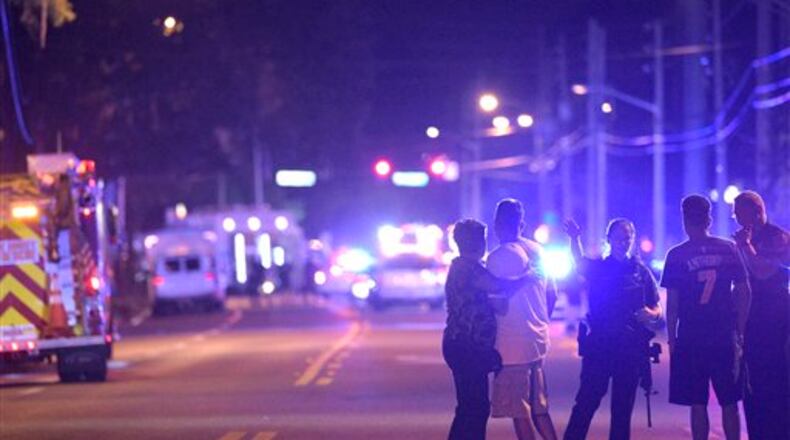What happened at Orlando's Pulse nightclub could have happened anywhere.
That's the fear that terrorists pack into every cowardly plan or attack. It gets people thinking of what constitutes a soft target, and how it feels to be a target, and whether it might be a good idea simply to stay home in some sort of voluntary confinement until the world starts feeling safe again.
The cool thing is most of us don't buy into that. We buy into life instead, lived the way we want it, and that includes the thousands of spectators worldwide who are on their way to the Rio Olympic Games in August.
I remember the first Olympics I covered in 1988 in South Korea, and asking my bosses if they would consider taking out a supplemental life insurance policy on me just in case North Korea carried through on its very public threat to blow a major dam north of Seoul and devastate the entire city with flooding. The answer was no, accompanied by the blunt admonition to go or don't go, but don't go scared.
Nothing happened, and it was the same at other Olympics I covered through the years in France, Japan, Australia and Italy. The exception was the city most familiar to me and supposedly the best protected. A pipe bomb loaded with masonry nails detonated during a post-midnight concert in Atlanta's Olympic Centennial Park in 1996, killing one and injuring 111.
Everybody fretted over which evil organization might be behind it and whether the Olympic competition, just halfway through a two-week run, should continue. Then the gates reopened and the turnstiles started spinning and every arena filled just as before. That felt good. It was just about the only thing that could.
Seven years passed before the bomber was caught. Turned out he was a lone wolf, born in Merritt Island, Florida, and not a soldier in some coordinated body from abroad.
Anyway, with all the worries about finishing stadiums on time and tamping down the Zika virus and getting mass transportation methods up to speed, Brazil's preparations to prevent terrorist attacks are considered by the world's law enforcement agencies to be adequate, based in part on the staging of the 2014 World Cup there.
That's in stark contrast to the U.S. State Department's warnings on European summer travel.
Through Aug. 31, the end of summer's peak travel season, U.S. citizens are officially alerted to "the risk of potential terrorist attacks throughout Europe, targeting major events, tourist sites, restaurants, commercial centers and transportation."
That pretty much covers the basics of any vacation, supplemented by the additional warning to "avoid crowded places," as if the Eiffel Tower or the Coliseum or Buckingham Palace ever have light days.
Right now in France, the month-long UEFA Euro soccer tournament is drawing thousands of fans from the 24 participating nations and many more. Avoiding crowds is not part of the process. Instead, every stadium and pub and train station at the various competition sites around France is packed with fans, plus the security forces needed to keep the rowdiest of them apart. Standard stuff.
Then you realize that the tournament's July 10 championship match is set for the stadium that was one of the targets for ISIS suicide bombers during last November's widespread Paris attacks. Is this the smartest strategy for minimizing potential dangers? Perhaps not, but it is the strongest response.
Tragedies like the Orlando shootings, senseless by definition, can happen anywhere. It still seems healthy psychologically to gather en masse in the most public of places, believing that the world's various intelligence and enforcement forces are grouping up, too, with the collective charge to root out the inhuman and let humanity thrive.
About the Author
Keep Reading
The Latest
Featured


